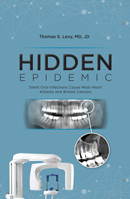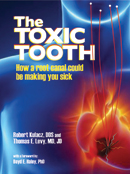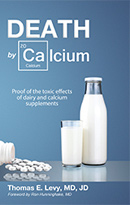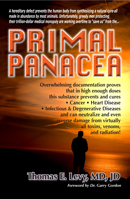Undiagnosed scurvy causes widespread disease
October 29, 2013 by Dr. Thomas LevyScurvy, as traditionally defined, is uncommon. The traditional definition of scurvy encompasses the changes that occur in the body when there is a severe and widespread deficiency of vitamin C. Such a state is characterized by generalized and pronounced weakness, anemia, and a generalized breakdown of the integrity of the connective tissue throughout the body, resulting in easy bleeding of the gums and into the soft tissues.
Death often occurs from hemorrhage or infection. In today's world, even the poorest of diets contains enough vitamin C to prevent this flagrant expression of scurvy. Many packaged foods have enough vitamin C as a preservative to keep classical scurvy at bay.
And, when rare cases of such scurvy do occur, they are seldom correctly diagnosed and treated before resulting in death from malnutrition or infection.
Scurvy can come in many degrees
The original definition of scurvy came from the large number of sailors who died after being on long sea voyages while consuming diets that turned out to have little or no vitamin C in them. This extreme version of scurvy is still the only version that most physicians know about even today. As long as someone is ingesting enough vitamin C to avoid dying from a full-blown case of scurvy, as noted above, most doctors consider neither scurvy nor any degree of vitamin C deficiency to exist.
Not surprising to the logical mind, however, there are many levels of vitamin C deficiency that fall short of producing classical scurvy. Minimal deficiencies cause little definable disease, while moderate and advanced deficiencies of vitamin C cause a wide spectrum of diseases and conditions that still are not recognized as being secondary solely to those deficiencies. We are in the midst of a chronic, substantial, yet still unappreciated epidemic of truly enormous proportions.
'Focal scurvy' determines your disease state
It has long been felt that a vitamin C deficiency in one area or tissue of the body means there is a comparable vitamin C deficiency everywhere else. Nothing could be further from the truth. In fact, it can reasonably be asserted that all forms of organ disease are really manifestations of a substantial vitamin C deficiency – just in that organ. The rest of the body is typically low in vitamin C as well, but not as low as in the diseased organ.
Focal scurvy in the lens of the eye produces a cataract. Focal scurvy in the lining of the heart arteries produces atherosclerosis. Focal scurvy in the bones produces osteoporosis. Focal scurvy in different areas of the brain produces Alzheimer's or Parkinson's disease.
Excess oxidative stress produces all disease, and vitamin C deficiency is at the root of all excess oxidative stress. Other antioxidants play important roles, but they can never completely compensate for a severe, focal (or widespread) deficiency of vitamin C.
Surely this does not mean that taking large amounts of vitamin C takes care of everything - does it?
Of course not. Vitamin C only tends to get severely depleted in one or more areas of the body when a chronic and substantial toxin exposure is being encountered on a regular basis, oftentimes '24/7' – when the source of toxicity is inside the body in the form of a chronic, unaddressed infection. What disease or condition develops depends on the biochemical properties of the toxin, the amounts produced, and the ability of the body to excrete it rather than accumulate it.
As discussed in earlier articles, root canal-treated teeth and other chronic nearby foci of infection like abscessed tonsils (often not suspected on examination) can result in vitamin C deficiencies that directly lead to potentially lethal diseases like, coronary atherosclerosis and cancers of the head and neck. Supplementing vitamin C is always of benefit, but significant foci of chronic infection are not negated completely by any degree of supplementation.
How do I know if I have one or more forms of focal scurvy?
Wherever you have disease, you have increased oxidative stress and you have some degree of focal scurvy in the affected area. How well and how completely you can treat such a condition depends largely on the mindset of your healthcare practitioner. Even at the point in time that you might feel completely well, you need to have careful monitoring of a number of routine blood tests to see that chronic derangements of some parts of your metabolism are still not resulting from the disease process.
Naturally, this requires a doctor aware of such interactions and willing to monitor them while managing your care.
References:
http://www.acamnet.org/site/c.ltJWJ4MPIwE/b.5457489/k.60DF/Welcome_to_PhysicianLink__18005323688_/apps/kb/cs/contactsearch.asp
http://orthomolecular.org/resources/pract.shtml
http://www.acimconnect.com/Resources/FindaHealthProfessional.aspx
Levy, T. (2011) Primal Panacea Henderson, NV: MedFox Publishing
http://www.medfoxpub.com/medicalnews/product/S-PRP/Primal-Panacea/Discovered-Natures-intended-cure-all/
More articles:
June 22, 2013 | Liposome-Encapsulated Glutathione
July 9, 2013 | Root canals are a primary cause of chronic disease
June 27, 2013 | Calcium, the Toxic Supplement
July 28, 2013 | Vitamin C With Vaccinations
August 3, 2013 | Avoiding Digestive Toxicity
August 10, 2013 | The disease causing dangers of high iron levels
August 19, 2013 | Vitamin C better than chemotherapy
September 2, 2013 | The marketing myth of ’vitamin C complex’
September 18, 2013 | Cardiologist speaks truth about cholesterol and statins
October 2, 2013 | Reverse shingles with vitamin C
October 14, 2013 | The effective prevention and treatment of radiation exposure
October 29, 2013 | Undiagnosed scurvy causes widespread disease
November 19, 2013 | Eliminate lead toxicity by consuming vitamin C
November 29, 2013 | New study says high fat diet is healthy
January 1, 2014 | Osteoporosis is much more than calcium deficiency
February 21, 2014 | Vitamin C is the 'muscle' of the immune system
March 11, 2014 | Reversing disease with the 'multi-C' protocol
April 6, 2014 | The dangers of magnesium deficiency
April 11, 2014 | Exposing the truth about liposomal nutrients
July 13, 2014 | Best nutrients to have in your ‘one a day’ supplement
August 3, 2014 | Surprising solution for Ebola virus
October 19, 2014 | Can natural protocols be an effective treatment for Ebola?
November 16, 2014 | Medical warning: Gluten allergies affect everyone
December 5, 2014 | Holistic dentistry pioneer Dr. Hal Huggins dies at 77 but his legacy will live forever
December 23, 2014 | Can a dental infection cause a massive heart attack?
January 29, 2015 | Most cardiologists shocked to discover the true cause of heart attacks
September 2, 2015 | The number one cause for 90 percent of all heart attacks
February 15, 2016 | The most popular vitamin C myths exposed
February 27, 2016 | How to effectively treat viral infections, including Ebola and Zika
March 14, 2016 | The never-ending war against vitamin C
May 22, 2017 | Vitamin C and sepsis: The genie is now out of the bottle
June 22, 2019 | Most cardiologists shocked to discover the true cause of heart attacks
July 3, 2019 | Can a dental infection cause a massive heart attack?
September 30, 2019 | Medical warning: Gluten allergies affect everyone
March 19, 2020 | Best nutrients to have in your 'one a day' supplement
October 30, 2020 | The dangers of magnesium deficiency
About NaturalHealth365
Dr. Levy regularly contributes brief articles of interest to the NaturalHealth365 website, which can accessed here: www.naturalhealth365.com.










